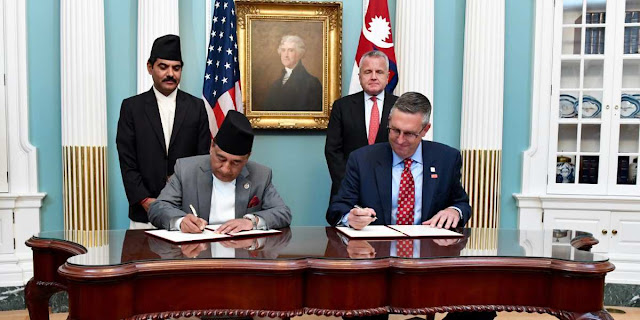
The Millennium Challenge Corporation (MCC) is a US government agency that provides grants to developing countries. In 2017, the MCC signed a $500 million grant agreement with Nepal to support the construction of transmission lines and power plants. However, the MCC has been met with widespread opposition in Nepal, with many people arguing that it is bad for the country.
What is the MCC?
The MCC is a US government agency that was created in 2004 to reduce poverty in developing countries. The MCC provides grants to countries that have demonstrated good governance and are committed to economic reforms. The MCC's grants are not loans, and they do not come with any political strings attached.What Does the MCC Agreement with Nepal Do?
The MCC agreement with Nepal will provide $500 million to support the construction of transmission lines and power plants. The project will help to improve Nepal's electricity grid and make it more reliable. The project is also expected to create jobs and boost economic growth.Why Do People Oppose the MCC in Nepal?
There are a number of reasons why people oppose the MCC in Nepal. Some people argue that the MCC agreement gives the US government undue influence over Nepal's domestic affairs. The agreement states that the MCC can interpret and enforce its own rules, even if they conflict with Nepal's laws. This gives the US government a veto over Nepal's policies, and it could be used to pressure Nepal to adopt policies that are not in its best interests.
Other people argue that the MCC agreement is not transparent. The MCC has refused to release the full text of the agreement to the public, and it has refused to answer questions about the agreement from Nepali lawmakers and civil society groups. This lack of transparency makes it difficult for Nepalis to understand the full implications of the agreement, and it raises concerns that the MCC is not acting in Nepal's best interests.
Still others argue that the MCC agreement is not in line with Nepal's national interests. The MCC's focus on infrastructure development ignores Nepal's most pressing needs, such as poverty alleviation and climate change adaptation. The MCC's focus on infrastructure development is also likely to benefit Nepal's elite at the expense of the poor.
Finally, some people argue that the MCC agreement is part of a US strategy to contain China. The MCC is a key part of the US's Indo-Pacific Strategy, which is aimed at countering China's growing influence in the region. The MCC's involvement in Nepal is seen by many as a way for the US to gain a foothold in Nepal and to use Nepal to contain China.
More Reasons Why Mcc is Bad for Nepal
In addition to the reasons mentioned above, there are a number of other
concerns about the MCC that have been raised by Nepalis. These include:
- The MCC agreement could lead to Nepal being drawn into the US-China rivalry.
- The MCC agreement could undermine Nepal's neutrality.
- The MCC agreement could lead to environmental damage.
- The MCC agreement could benefit foreign companies at the expense of Nepali businesses.
Given
these concerns, it is clear that the MCC is not in the best interests
of Nepal. Nepalis should reject the MCC agreement and demand that the US
government respect Nepal's sovereignty and national interests.
Conclusion
For all of these reasons, the MCC is bad for Nepal. The MCC agreement gives the US government undue influence over Nepal's domestic affairs, it is not transparent, it is not in line with Nepal's national interests, and it is part of a US strategy to contain China. Nepalis should reject the MCC agreement and demand that the US government respect Nepal's sovereignty and national interests.
Additional Concerns about the MCC




_11zon.jpg)
_11zon(1).jpg)

![Canon MF3010 Price in Nepal [Latest Updated]](https://blogger.googleusercontent.com/img/b/R29vZ2xl/AVvXsEgJA0j12Vyn5bTdbIdul1kWdR5QiTuYfnUbgw7RbQJey305nF68g5bgVoAYAGVIYkJxW26Q7DFWwXt6c4hk_uXhIflWB0j34oyqy9Xcfr8ZnFbgUSP0o2mGSJ1QJn_Hmvq0gT5s7A80z_JGnJTVF_tboGspuAK_nQf1fxDqOhHBGZ4IWHJqybk3PUfm/w680/images.jpg)
